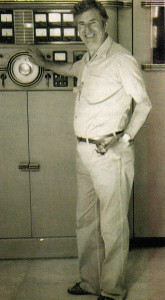
As a schoolboy in the 1930s I was fascinated with my crystal set, but the sounds in the headphones kept disappearing when the ‘cat’s whisker’ was disturbed. It only needed someone to stamp his feet.
I longed for something more reliable, and my heart leapt when a fellow pupil sold me a three-valve mains radio for half a crown. I paid up, but found the receiver was minus valves and a loudspeaker. I managed to buy a speaker cheaply, but now I needed three valves.
I rummaged through my father’s box of discarded radio parts, haphazardly plugging likely-looking valves into the sockets. Suddenly I struck lucky. Instead of the set blowing up in smoke, the loudspeaker burst into life. I had my first working mains radio!
With an aerial round my bedroom picture rail I was soon listening to Radio Luxembourg, Paris, Moscow and other exciting places. I sang along with the Ovaltineys, and responded to appeals for reception reports.
All went well until a propaganda magazine dropped through our letter-box from Radio Moscow. My parents were horrified. My father said sternly: “Don’t you realise, our address is now listed in the Kremlin.” Fortunately my precious wireless set was not confiscated.
I soon resumed my long-distance listening and reporting (it’s called DXing), although I avoided Radio Moscow for a while.
During the Second World War I was a flying-boat navigator, so was able to pursue my hobby using powerful RAF equipment. Loop bearings, while flying, helped keep me on track, and back at base – a palm-fringed lagoon in Sri Lanka -1 was able to tune in on control-tower receivers. Our aerial was slung between two tall palm trees and stations came booming in.
One night I picked up a BBC World Service newsflash. I rushed to a nearby camp concert, mounted the stage, and announced: “The war is over!” The cheers that followed echo in my ears to this day. Back home in ‘Civvy Street’ after the war, I was soon searching the radio dial again, and sending off reception reports. Back came a welter of QSL (confirmation) cards and souvenirs, so many that my friendly radio shop mounted a display of them, with my Radio Australia card a central feature. It even made the local paper.
But the best was yet to come.
One day in 1981 was logging a broadcast from Radio Monte-Carlo when the announcer said: “We’ve got a party of English visitors touring the station today.” I dashed off a reception report and added: “Any future visits planned?” I got a positive reply, and a few months later my wife and I were travelling across France with a coach party of 51 fellow radio enthusiasts. At the pocket republic we were welcomed by station officials, and during our seven-day stay were taken on guided tours of the studios and transmitter.
The tiny country has one of Europe’s most powerful transmitters. It specialises in Gospel broadcasts and these go out, round the clock, in 32 languages. Millions are tuned in to the station night and day, and I was thrilled to be there shaking hands with the staff and discussing the programmes.
During our week we also had time to explore the historic waterfront, see the famous casino and watch the changing of the guard at the Prince’s Palace.
It was a holiday of a lifetime – and it all stemmed from fiddling about with a crystal set in the 1930s.
Ron Montague








